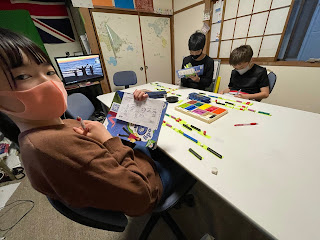Casually mentioned I was trying to teach "The Narrative Tenses" last Thursday evening, via Swarm, and then had a bit of a 'mare doing so. Friend, inspiration and twitter vivant
+Michael @mickstout promptly asked me about resources to do so. Oh hell, called out!
Back story = used to employ a DELTA-qualified teacher whose every second sentence was about teaching the narra'ive tenses (
Geordie), how good he was at it (them?) and that we should all d'off caps & bend a knee to the genius before us. But seeing as we have never had that many students in the rarefied reaches of
advanced storytelling...you do need a bit for YLE Movers but you can generally get by without having to display any grasp of the past perfect simple/past perfect continuous/etc...in fact if you even tried, I think the speaking examiner would shake your hand!
This particular class week was missing the storytellers, instead only the 'answers on the next page already filled in' students had turned up. Any
story telling they do attempt is in L1. My 'pardon?' usually gets a 'No, no' + dismissive hand wave. Been there? Can never introduce something stealthily or creatively because my thunder eternally stolen "that's on p45"...
Nuts & bolts of had +
past participle etc all diligently underlined. But grasping the actual concept? Timelines, arrows, arm waving...Jim sensei needed to hit reset and start again.
So not only scratching my head all week about how to rescue the befuddled students from last week's grammatical cul de sac, needed to actually impress a colleague as well - or at least try to reply.
My students share the same language, and are not natural story tellers nor inquisitors. Imagine the opposite of Irish or Italian, maybe? Any contribution usually delivered as a set piece, accepted universally & scarcely a comment or question there be afterwards.
As usual, simplest is best, and decided after rummaging my collection of supplementary materials that nothing was really going to present itself. I needed to detox the class from the dreaded G terminology & translation mindset, and in some parlance
flip the classroom. Keep books in bags, concentrate on imaginative brain, banish pencils, avoid turn-taking & prevent dominant personalities railroading others. Time too for me to be quite a lot more intrusive than I usually am (inviting fluency and letting 'errors' go).
 |
| A board game with out story telling limits |
Solution. A narrative.
Dived into the back of our games cupboard & found Never Ending Stories (sorry, that awful song will start in your brains too!) - for age 6+ it says on the box. Ideal. Very simple. Totally random. Players plop cards onto a board in turn, and develop a story as suggested by the images on them (characters, objects, locations) in the order they have been played. Past tenses great. But the 'forgotten' past?
Start at the end of the story and add cards to try to get to the beginning, back-filling detail as you go. This is where the teacher needs to be very involved asking for connections, suggesting links, checking/requiring details eg Were they married before? What happened? How did they meet? and letting the whole group contribute - player whose turn it is selects 'best help' and adds the bits up. Importantly, before the next turn, teacher as narrator recaps - helping everyone keep up with developments and providing a model. Embellishment with current events etc as they occur to you are great, as students then get to see the rationale for the tenses you are using, without focusing on the tenses you are using per se - at least if the story is interesting! I challenge anyone to recount the same (and ever expanding) story the same way twice without leaving bits out; students need to see this is the beauty of storytelling not the mental linear blockage some see it as. Grammatical flexibility gets you over the hurdle and you can 'keep going' without having to go all the way back to the beginning of the timeline and get things 'in order' Students love pointing out the teacher's mistakes....ask them if you left something out...and 'rescue' yourself with a post script.
 |
| How our story unfolded - narrative to come |
So, for me, interrupt like mad at the creative brainstorming phase, establish chronology and link bits together grammatically - then let that part of the story be told however it comes out. Once a turn is 'done'; gently re-tell it to check you got it right (include 'corrections' here?), and help the other students with a second listening before connecting all the other previous parts.
So there has to be a digital way to do this, for classes with wifi & tech savvy learners.Voicethread would be one way to collate a final version, I think, and could be done outside of class/before the next class. Sock Puppet, minus the time limit, another idea. Fotobabble only gives you 90 seconds - but ideal per pic?
In class, with confident students I think a
Pecha Kucha type approach might work. You could also trawl ELTpics or any theme in
Flickr - or go random and use flickr as a screensaver (hands free, adjust time images shown to suit skills).
Another randomiser = give a student a slip of paper with a ridiculous scenario on it and have them bluster their way out of it - kind of
Liar's Game. (eg "You were seen climbing out of a nightclub window at 8am this morning wearing a superman suit") Of course allow questions from the floor. Big class, have 2 or 3 students sit at the front and have them tell a story. Only one is true, room votes at end of story & Q/A on which one. NB They can all be false, but the winner = most convincing liar?!













